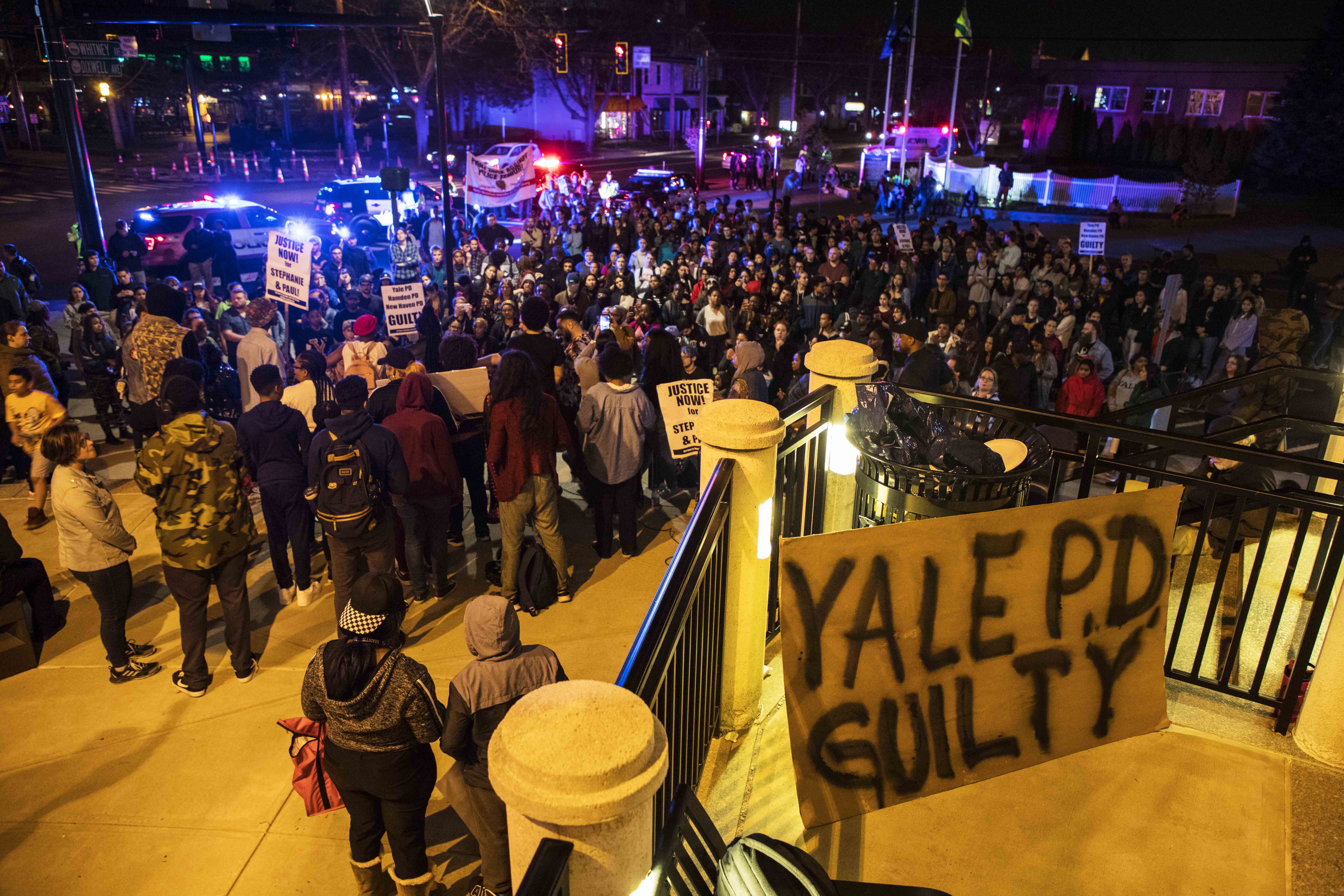
Over the weekend, local activists and community members continued to demand justice for Stephanie Washington and Paul Witherspoon, who were shot by a Yale police officer and a Hamden police officer early Tuesday morning. New Haven and Yale activists rallied and called on relevant authorities and branches of law enforcement to meet community demands.
Less than 17 hours after the end of Thursday evening’s seven-hour, 500-person protest that shut down major streets for hours in downtown New Haven, hundreds reconvened and gathered on Hamden Plaza on Friday evening. The group marched down Dixwell Avenue — a main road conjoining the two cities — for four hours, chanting “No justice. No peace. No racist police” and singing “Ain’t Gonna Let Nobody Turn Me Round,” among other songs and chants. Eventually, they stopped in front of the police headquarters, where the group chanted, facing at least six Hamden Police officers who stood before their police cars that were flashing lights.
“We can’t allow the timing, being at the end of the year, to distract us from the gravity of it,” Ben Dormus ’21, who serves on the executive board of the Yale Black Men’s Union, told the News. “It’s trying to keep the momentum up and realizing that we have limited time to set ourselves up for a continued battle on behalf of black and brown New Haven residents, on behalf of Stephanie and Paul, in this specific case, and on behalf of black and brown Yale students.”
The popular effort continued on Sunday in Newhallville, where the shooting occurred. On Saturday, officials from the Hamden Police Department told the public that the investigation would likely conclude early this week, after which all relevant materials would be released.
No New Haven Police Department officers were involved, but the shooting took place within the bounds of New Haven proper.
Salovey announced on Wednesday that Terrance Pollock, the Yale police officer identified as one of the two officers who shot at Washington and Witherspoon, is currently on administrative leave. Yale Office of Communications released a summary of information on April 20 that confirms that the Yale officer was wearing a body camera but that the bodycam and vehicle dash footage is in custody of state officials.
In January — after decades of activism — New Haven established a Civilian Review Board to hold the city’s police department accountable for brutality. But the shooting of Washington and Witherspoon has highlighted a lack of uniform practices for inter-town processes and statewide accountability, as well as presented questions of jurisdiction between police departments and who ought to be able to police whom.
A coalition of Yale students has raised concerns over the purpose of the Yale Police Department. On Saturday at 10 p.m., Black Students for Disarmament at Yale — a group formed in the wake of last week’s shooting and composed of students affiliated with various groups out of the Afro-American Cultural Center, including the Yale Black Women’s Coalition, the Black Men’s Union and the Black Student Alliance at Yale — released a letter addressed to University President Peter Salovey, Yale Police Chief Ronnell Higgins and other University administrators requesting that the Yale Police Department, a private police force that shares its jurisdiction with the New Haven Police Department, be disarmed of lethal weapons. According to University spokesperson Tom Conroy, the YPD exists to “ensure the safety of the [Yale] community.”
The letter cited the YPD’s armed status and ability to police outside of designated Yale campus property as an exercise of power that “is incongruent with the needs of Yale students and New Haveners.”
“Yale must take responsibility for the authoritarian role it plays in New Haven. Yale must acknowledge its complicity in the violence its private police force commits against New Haveners. Yale must respect the voices of citizens and students alike who have spoken against police occupation for many years,” the letter wrote.
In addition to requesting disarmament, the group called for Pollock’s termination, immediate release of body camera footage and restriction of YPD’s patrol area to Yale’s campus. As of Sunday evening, no body camera footage has been made available to the public.
University Secretary and Vice President for Student Life Kimberly Goff-Crews followed up last week’s schoolwide statement from Salovey with a campus wide email on Saturday. Goff-Crews reiterated that the state investigation was pending and that Yale would support the release of all relevant materials after its conclusion.
“The university supports making the results of the investigation public, including the release of any recordings of the incident that may exist, as soon as the State’s Attorney determines they may be released,” Goff-Crews wrote Saturday.
In a Friday morning statement, Commissioner James C. Rovella of the state’s Department of Emergency Services and Public Protection announced that the state expected “to release to the public details of the investigation including body camera video next week.”
But the American Civil Liberties Union of Connecticut has countered that no policy requires that video footage be held while investigations are pending. ACLU Director of Strategic Initiatives Melvin Medina published an article on the ACLU CT website stating that the Hamden Police Department has the power to release the body camera footage immediately.
Yale Office of Communications stated that Yale is not permitted to conduct its own investigation until the state investigation is terminated.
Sammy Westfall | sammy.westfall@yale.edu
Angela Xiao | angela.xiao@yale.edu
Interested in getting more news about New Haven? Join our newsletter!







